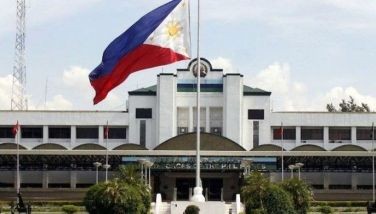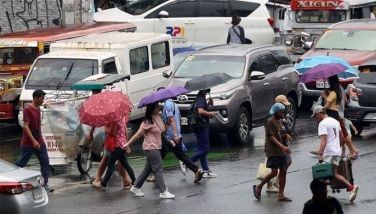RP escapes FATF sanctions

March 15, 2003 | 12:00am
The international body leading a campaign against money laundering said yesterday it had dropped plans to impose financial sanctions on the Philippines after Manila passed a new law aimed at fighting dirty money.
The Financial Action Task Force (FATF) said the new measures, which President Arroyo signed last week, addressed the main legal deficiencies in the country’s anti-money laundering rules.
However, the FATF said it would continue to monitor the situation in the Philippines, which would remain on its list of "non-cooperative countries and territories" until it had implemented the new legislation.
"This is a significant success for the FATF and the Philippines in the fight against money laundering," FATF president Jochen Sanio said in a statement.
Malacañang hailed the decision of the Paris-based body and expressed relief that it gave its seal of approval to Republic Act 9194 or the amended Anti-Money Laundering Act (AMLA).
"I’m very thankful for the news that we won’t have any sanctions on our international financial transactions," Mrs. Arroyo told a hastily called press conference at Malacañang yesterday.
The next step for the government, she said, is to ensure its implementation. "The law is already good as it is. What is important is the implementing rules and the actual implementation," she said.
Mrs. Arroyo said one of the most immediate steps to be taken by the Philippine government is to renew its standing request to the United States to provide technical assistance on how to effectively implement the law on money laundering.
"During my first trip to the US, we discussed that since America is very sensitive in these talks about money laundering, they should give us technical assistance on how we can run after money laundering," she said.
The Paris-based body, which is backed by some 30 countries, had previously threatened to place sanctions on the Philippines for failing to do enough to crack down on money laundering.
The sanctions would have put the Philippines under tighter financial security, threatening to slow the flow of trade and billions of dollars sent home each year by Filipinos working abroad, and standing to hit an economy suffering from ballooning oil prices and budget deficit woes.
Sanio said it would monitor the money laundering situation in the Philippines and discuss what steps to take next at a meeting in Berlin on June 18-20.
Sen. Ramon Magsaysay, Jr., principal defender of the AMLA amendments when it was still pending in the Senate, said the decision of FATF to withhold sanctions on the Philippines is the triumph of the entire nation,
"The battle has been won for all of us. Republic Act 9194 is an achievement of the entire Filipino nation," he said.
"The issues raised during the debates were all valid concerns, bringing out the best arguments and the worst of accusations, but in the end, the Filipinos have won. There are no losers here, only winners," he added.
For his part, US Ambassador Francis J. Ricciardone heaped praised on Speaker Jose de Venecia Jr. for his "wise and steady leadership in winning the passage of the amendments" to the AMLA.
"You chaired the crucial legislative sessions that led to this breakthrough," Ricciardone told de Venecia in a letter.
The US government, he said, welcomed the enactment of the new law as "important" to both the Philippines and the United States.
However, the FATF said the Philippines would remain on its blacklist of 10 countries and territories failing to crack down on money laundering until Manila effectively implemented the new legislation.
De Venecia said the Anti-Money Laundering Council (AMLC) and the FATF will now work out a program of implementation to ensure full compliance with the law.
He expressed confidence its full implementation will lead to the Philippines’ removal from the FATF watch list of non-cooperative countries and to the country’s eventual membership in the Paris-based task force.
While the Philippines is still in its list of non-cooperative countries and territories, FATF said its so-called Recommendation 21 would be in force.
Under this scheme, financial institutions are directed to give "special attention to business relations and transactions with persons, including companies and financial institutions, from countries that do not or insufficiently apply the recommendations."
Whenever these transactions appear to have no apparent economic or visible lawful purpose, the FATF said its members should check their background and purpose.
The examination, according FATF, would be conducted "as far as possible, and the findings established in writing, and be available to help supervisors, auditors and law enforcement agencies."
The other countries and territories on the FATF blacklist along with the Philippines are the Cook Islands, Egypt, Guatemala, Indonesia, Myanmar, Nauru, Nigeria, St. Vincent and the Grenadines and Ukraine. Russia was removed from the blacklist in October.
The tiny Pacific island state of Nauru is the only country or territory subject to full-blown FATF sanctions.
The Financial Action Task Force (FATF) said the new measures, which President Arroyo signed last week, addressed the main legal deficiencies in the country’s anti-money laundering rules.
However, the FATF said it would continue to monitor the situation in the Philippines, which would remain on its list of "non-cooperative countries and territories" until it had implemented the new legislation.
"This is a significant success for the FATF and the Philippines in the fight against money laundering," FATF president Jochen Sanio said in a statement.
Malacañang hailed the decision of the Paris-based body and expressed relief that it gave its seal of approval to Republic Act 9194 or the amended Anti-Money Laundering Act (AMLA).
"I’m very thankful for the news that we won’t have any sanctions on our international financial transactions," Mrs. Arroyo told a hastily called press conference at Malacañang yesterday.
The next step for the government, she said, is to ensure its implementation. "The law is already good as it is. What is important is the implementing rules and the actual implementation," she said.
Mrs. Arroyo said one of the most immediate steps to be taken by the Philippine government is to renew its standing request to the United States to provide technical assistance on how to effectively implement the law on money laundering.
"During my first trip to the US, we discussed that since America is very sensitive in these talks about money laundering, they should give us technical assistance on how we can run after money laundering," she said.
The Paris-based body, which is backed by some 30 countries, had previously threatened to place sanctions on the Philippines for failing to do enough to crack down on money laundering.
The sanctions would have put the Philippines under tighter financial security, threatening to slow the flow of trade and billions of dollars sent home each year by Filipinos working abroad, and standing to hit an economy suffering from ballooning oil prices and budget deficit woes.
Sanio said it would monitor the money laundering situation in the Philippines and discuss what steps to take next at a meeting in Berlin on June 18-20.
Sen. Ramon Magsaysay, Jr., principal defender of the AMLA amendments when it was still pending in the Senate, said the decision of FATF to withhold sanctions on the Philippines is the triumph of the entire nation,
"The battle has been won for all of us. Republic Act 9194 is an achievement of the entire Filipino nation," he said.
"The issues raised during the debates were all valid concerns, bringing out the best arguments and the worst of accusations, but in the end, the Filipinos have won. There are no losers here, only winners," he added.
For his part, US Ambassador Francis J. Ricciardone heaped praised on Speaker Jose de Venecia Jr. for his "wise and steady leadership in winning the passage of the amendments" to the AMLA.
"You chaired the crucial legislative sessions that led to this breakthrough," Ricciardone told de Venecia in a letter.
The US government, he said, welcomed the enactment of the new law as "important" to both the Philippines and the United States.
However, the FATF said the Philippines would remain on its blacklist of 10 countries and territories failing to crack down on money laundering until Manila effectively implemented the new legislation.
De Venecia said the Anti-Money Laundering Council (AMLC) and the FATF will now work out a program of implementation to ensure full compliance with the law.
He expressed confidence its full implementation will lead to the Philippines’ removal from the FATF watch list of non-cooperative countries and to the country’s eventual membership in the Paris-based task force.
While the Philippines is still in its list of non-cooperative countries and territories, FATF said its so-called Recommendation 21 would be in force.
Under this scheme, financial institutions are directed to give "special attention to business relations and transactions with persons, including companies and financial institutions, from countries that do not or insufficiently apply the recommendations."
Whenever these transactions appear to have no apparent economic or visible lawful purpose, the FATF said its members should check their background and purpose.
The examination, according FATF, would be conducted "as far as possible, and the findings established in writing, and be available to help supervisors, auditors and law enforcement agencies."
The other countries and territories on the FATF blacklist along with the Philippines are the Cook Islands, Egypt, Guatemala, Indonesia, Myanmar, Nauru, Nigeria, St. Vincent and the Grenadines and Ukraine. Russia was removed from the blacklist in October.
The tiny Pacific island state of Nauru is the only country or territory subject to full-blown FATF sanctions.
BrandSpace Articles
<
>
- Latest
- Trending
Trending
Latest
Trending
Latest
Recommended





























